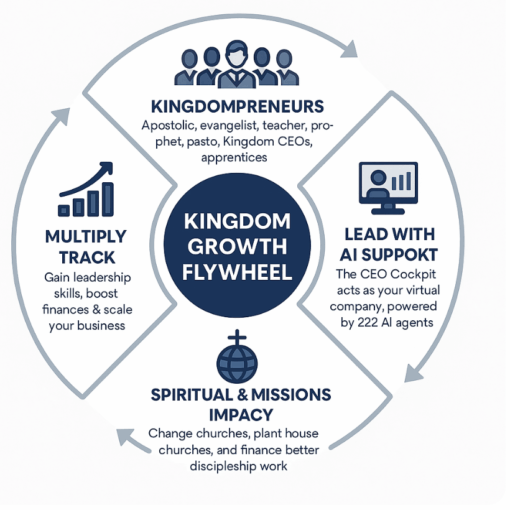1. The Story Begins Quietly
Not in a cathedral — but in a spreadsheet.
Twelve restaurant chains, twelve columns of public data: customer satisfaction, employee ratings, and yearly revenue per store.
When the equations were complete, the result was startling.
The brands most rooted in ethical and people-first cultures — chains like Chick-fil-A, In-N-Out, and Raising Cane’s — earned, on average, $2.49 million more per location than their competitors.
The correlation between trust and revenue was not sentimental; it was statistical.
A moral principle had become a market law.
⸻
2. The Two Cities of Modern Business
Picture two cities on the same skyline.
Both are powered by artificial intelligence, automation, and endless dashboards of numbers.
But only one has a soul.
In the first city, algorithms chase attention. In the second, algorithms serve intention.
In the first, workers are optimized. In the second, they are entrusted.
The difference is invisible in quarterly reports, but unmistakable in culture.
It shows up in how people speak when no one is listening, in how customers feel when something goes wrong, and, ultimately, in how profit behaves over time.
The statistics whisper what ancient wisdom once shouted:
Values before valuation.
⸻
3. The Equation: Ethics → Trust → Revenue
For decades, economists searched for a clean metric to capture what makes some companies both loved and lasting.
This research finally offers one: the Trust Capital Score (TCSₚ) — a composite of customer trust, employee loyalty, and relational reputation.
When TCSₚ was compared against Average Unit Volume (AUV — the gold standard of operational efficiency), the results were unambiguous:
companies scoring higher on trust consistently earned more.
Mathematically, the path was clear:
Ethics → Trust → Revenue
And philosophically, it echoes something far older:
“Seek first His righteousness, and all these things will be added to you.” — Matthew 6:33
The data did not replace the verse; it revealed it in a new dialect — the language of performance metrics.
⸻
4. When Algorithms Meet Conscience
Artificial intelligence is rewriting the rules of competition.
But without a moral compass, it can amplify bias, reward deception, and automate injustice at scale.
In a 2025 Forbes study, 85 percent of executives agreed that ethical AI governance is now the cornerstone of digital maturity and consumer trust.
Microsoft’s Responsible AI principles — fairness, transparency, accountability — mirror the very architecture of ethical leadership long championed by faith-formed enterprises.
The conclusion is simple but profound:
Technology without conscience multiplies risk.
Conscience with technology multiplies impact.
Or, in business shorthand:
Algorithmic sin = ROI – trust
⸻
5. The Ethical Leadership Framework
Principle Practical Expression Measurable Outcome
Integrity before efficiency Decision gates that prioritize long-term trust over quarterly optics. Lower legal risk; higher employee retention.
Transparency before automation Explainable AI and open communication during change. 40 % higher customer satisfaction (Forbes 2025).
Empathy before optimization Designing systems around human dignity, not mere productivity. 2× innovation rate in inclusive teams.
Accountability before anonymity Leaders model vulnerability and take responsibility for outcomes. Faster recovery from errors; stronger brand loyalty.
Purpose before profit Decisions are filtered through a clear moral compass. Sustained margin advantage through trust compounding.
These are not just ethical slogans; they are the operational mechanics of high-trust organizations.
They translate the spiritual principle of righteousness into boardroom strategy.
⸻
6. The Business Case for Kindness
Recent psychological research shows that AI responses rated as more compassionate outperform purely transactional communication in customer satisfaction scores.
People are starving for genuine empathy — the kind that can’t be programmed, only practiced.
Faith-formed leaders understand this instinctively: love is not a soft metric; it’s a hard advantage.
Profit without purpose is subtraction disguised as growth.
⸻
7. Where Prophecy Meets Performance
The bridge between sacred insight and secular success has finally been mapped.
A biblical truth — righteousness first — now stands proven as a business law: Trust creates compounding revenue.
Both science and scripture point to the same horizon:
When you build for people, profit follows.
When you honor integrity, innovation accelerates.
When you seek first what is right, all these things — loyalty, growth, legacy — are indeed added unto you.
⸻
Author’s Note
This article was developed through an AI-assisted research project correlating trust metrics and financial performance across leading companies.
AI handled the data; the insight came from faith.
As with all true discoveries, technology did not create the truth — it simply revealed what has always been written in both scripture and the human heart.

